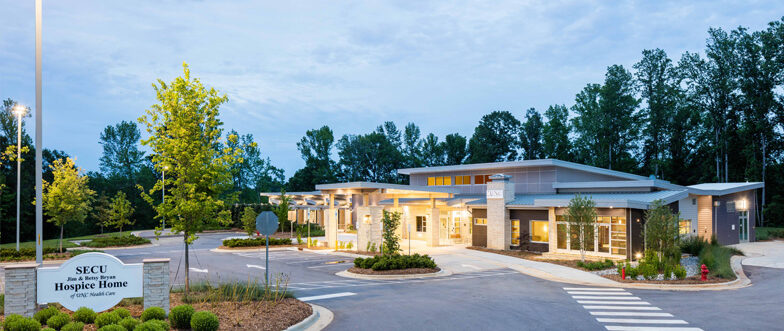Clinical Rotations
Inpatient Adult Palliative Care
Transitions LifeCare
UNC Psychosomatic Medicine and Comprehensive Cancer Support Program
UNC Hospice
NC Children’s Hospital Supportive Care Team
Outpatient Oncology Palliative Care Clinic
UNC IPU
Elective
UNC Palliative Care Consult Service

The UNC Palliative Care Program provides inpatient consultations to all UNC Hospitals (UNCH) patients. UNCH is a consortium of geographically linked medical, surgical, women’s, children’s, neuropsychiatric and oncology hospitals with a total bed capacity of 798. UNCH serves both as a community hospital and a referral center for patients from all 100 North Carolina counties. UNCH serves as one of the state’s major safety net hospitals and receives annual state legislature funding for uninsured care. Annually the UNC Palliative Care Program serves over 1,000 patients.
The adult Palliative Care Consult Service serves patients with a diverse array of life-limiting diagnoses. While cancer is the most frequent diagnosis consults are completed for patients with other common life-limiting conditions, including heart, liver, lung and neurologic diseases. Patients seen by the consult service are at different stages of illness from initial diagnosis to actively dying. The consult service routinely serves individuals who are African-American and Latino (35% minority patients).
The adult inpatient Palliative Care Consult Service is staffed by board-certified Hospice & Palliative Medicine (HPM) physicians, nurse practitioners, social worker and chaplain. Fellows will participate in all team activities and receive supervision from all team members. Fellows will receive increasing patient care responsibilities evolving from direct observation by team members to independent practice with oversight from the attending physician. Teaching of fellows in palliative care competencies will occur during team rounds, at the bedside, after patient and family encounters and through review of fellows’ documentation.
Founded as Hospice of Wake County in 1979, this non-profit organization recently changed its name to reflect its expanded scope of services to individuals and families in a six county area.
The TL hospice program has an average daily census of approximately 480 patients receiving services in their homes, an inpatient unit and long-term care facilities. TL also provides palliative care services across the health care continuum, including a consult service at WakeMed Hospital as well as consults and follow-up visits in patients’ homes and long-term care facilities.
Fellows will rotate in the inpatient hospice unit, and provide hospice and palliative care services in the home and long-term care settings.
TL operates a Medicare-certified 20 bed acute inpatient hospice care unit for patients with significant symptom burden and limited prognoses. Fellows will provide medical care for patients in this facility with supervision from board-certified HPM physicians and other interdisciplinary team members. This rotation will focus on symptom management skills, managing transitions of care to and from the facility, and caring for imminently dying patients and their families. Fellows will participate in daily rounds, and weekly interdisciplinary team meetings and remembrance ceremonies.
Hospice – Home and Long-Term Care
TL hospice serves a diverse patient population in terms of primary diagnosis and social backgrounds. Hospice services are provided in patients’ home and in long-term care facilities. Fellows will be integrated into one of TL’s hospice teams consisting of a physician, nurse, psychosocial clinician and chaplain. Initially fellows will directly observe new and follow-up visits completed by other interdisciplinary team members to experience the distinct care strategies and challenges in caring for patients with advanced disease in the home and long-term care settings. Fellows will progressively receive increased patient care responsibilities, including independent completion of hospice visits and serving as the first contact during business hours for a panel of home and long-term care hospice patients. After clinical encounters, fellows will communicate with the patients’ nurse or physician to solicit feedback, receive teaching regarding pertinent clinical issues, and confirm the team’s agreement with the fellows’ proposed care plan. Interdisciplinary team members will provide fellows with indirect supervision or oversight for all patient care activities conducted independently. Fellows will participate in biweekly interdisciplinary team meetings during which they will communicate their patient and family assessments and contribute to decision-making regarding patients’ initial and subsequent hospice certifications.
Palliative Care – Home and Long-Term Care
Transitions staff completed more than 800 palliative care visits in patients’ home and long-term care facilities last year. Fellows will initially participate in palliative care consultations with a physician dually certified in Geriatric Medicine and HPM, and will learn how these consults differ among the home, long-term care and hospital settings. Fellows will then independently complete palliative care visits with physician and nurse practitioner oversight. Fellows will learn the importance of effective communication with long-term care staff to promote appropriate assessment and management of patients’ symptoms and overall care needs. In addition, fellows will consider the similarities and differences among patients receiving palliative care and hospice services in long-term care settings, how Transitions team members communicate to long-term care staff, patients and families about available care options, and the factors associated with decisions to transition long-term care patients from palliative care to hospice services.
Given the prevalence of dementia in long-term care settings, fellows will receive didactic teaching regarding behavioral disturbance assessment and management, feeding problems, and symptoms for patients incapable of expressing their needs. Additional teaching will address caregiver stress, approaches to effective physician-family communication and advance care planning strategies for patients lacking decision-making capacity.
WakeMed Raleigh Hospital Consult Service
At WakeMed Hospital in Raleigh, a non-profit hospital providing more than 85% of uninsured care for North Carolina’s most populous county, TL staff completed more than 1000 consults last year for patients with diverse primary diagnoses, palliative care needs and ethnicities (27% minority). Supervised by a HPM board-certified physician, fellows will complete new and follow-up consults in this community hospital setting and collaborate with referring physicians and nurses.
UNC Psychosomatic Medicine and Comprehensive Cancer Support Programs
Through inpatient and clinic visits with physicians and health professionals from other disciplines, fellows will learn about the diagnosis and treatment of psychiatric disorders and difficulties in patients with life-limiting conditions. These difficulties include depression, delirium and assessment of decision-making capacity. Particular focus will be given to addressing the psychosocial and mental health needs of patients with cancer at all stages, such as during disease-directed treatment periods, advanced disease and survivorship.
The goal of UNC Hospice is providing specialized care focused on comfort, compassion, and support for patients with advanced illness and their families. Hospice is for patients with serious illness who wish to prioritize comfort-focused care and quality of life over curative treatments at the end of life. Hospice focuses on providing care where the patient is (home or in a living facility).
The hospice team offer many types of support including on-call nursing care round-the-clock, guidance from medical social workers, certified nursing assistants to provide help with personal care, assistance with medications, handling medical supplies and equipment, and other things.
Hospice is a member organization of UNC Health and partner closely with UNC hospitals, clinics, and care providers to maintain continuity of care. Hospice also works closely with patients’ primary doctors to ensure patients get the high-quality, appropriate care.
NC Children’s Hospital Supportive Care Team
The Supportive Care Team provides Palliative Care consultations for children on all inpatient General Pediatrics and subspecialty services in the North Carolina Children’s Hospital which is part of UNCH. Created in 2011, the team completed approximately 200 new patient consults and 750 total patient visits last year. The team includes 4 board certified HPM physicians, a HPNA certified nurse practitioner, a child psychologist, social worker, and collaborates closely with the chaplain and child life specialists.
Fellows will participate in all team activities, including team rounds and new and follow-up consult visits. Fellows will join at least one other team member as they collaboratively complete clinical services. During this rotation fellows will learn principles of symptom management, communication skills and decision-making facilitation for children with chronic and life-threatening conditions. Fellows will consider how these principles may differ compared with adult patients based on children’s distinct needs. In addition, fellows will learn how a Palliative Care interdisciplinary team functions to serve the needs of seriously ill children and their families.
Outpatient Oncology Palliative Care Clinic
Fellows will maintain an outpatient clinic for a half day each week in the North Carolina Cancer Hospital’s Outpatient Oncology Palliative Care Clinic. Developed as an outgrowth of the inpatient Palliative Care consult service, a physician dually certified in Medical Oncology and HPM, an oncology-certified pharmacist and a nurse practitioner comprise the interdisciplinary team.
The Outpatient Oncology Palliative Care Clinic receives referrals from the inpatient Palliative Care consult service and all oncology disciplines. The clinic team provides both consults for the referring physician and longitudinal care that complements the disease-based treatments offered by the primary oncologist. Visits are scheduled in advance or occur acutely at the request of the patient’s oncologist. While acute visits primarily address patients’ unmet symptom management needs, fellows will complete comprehensive palliative care assessments with new patients that includes communication of advance care planning options and identification of available resources to complement patients’ coping and support strategies. Fellows will complete new patient consultations and follow-up visits while receiving direct or indirect supervision from Outpatient Oncology Palliative Care Clinic team members.

At the SECU Jim & Betsy Bryan Hospice Home in Pittsboro, NC, UNC Hospice provides compassionate care outside of hospital setting. This allows patients to finish out their lives with meaning and peace. Located in a beautiful wooded setting the facility houses 10 private patient rooms, each with its own private patio. The surrounding gardens are home to native birds and butterflies and families are welcome. Services include general inpatient hospice care, respite care, and residential care.
WakeMed Raleigh Hospital Consult Service – optional two-week elective
Fellows will meet with the program director to choose their elective rotation based on their interests and career goals. With this time, they can pursue additional experiences with any of the required fellowship rotations in palliative care, hospice or psycho-oncology to deepen and intensify their skills and exposure. Other elective opportunities include the following programs:
- Anesthesiology Pain (inpatient consult service and outpatient clinic)
- Ethics (inpatient consult service)
- Gynecologic Oncology (outpatient clinic)
- Hospice Medical Director administration (working with TL Medical Director)
- Medicine subspecialties: Cardiology (Heart Failure), Critical Care, Geriatrics, Nephrology, Oncology (inpatient services and outpatient clinics)
- Radiation Oncology (inpatient consult service and outpatient clinic)
- Reaching out to Enhance the Health of Adults in their Communities and Homes – REACH (home visit program for adults with complex chronic and progressively debilitating disease)
Each elective will enhance fellows’ developing competence in caring for patients with life-limiting conditions. The emphasis will be on learning how colleagues in different fields and care settings manage symptoms and approach the communication needs of seriously and chronically ill patients and their families.